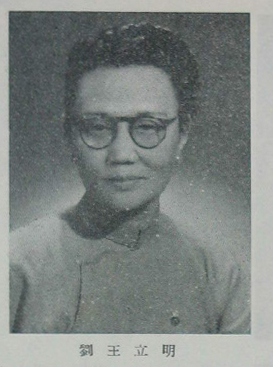Liu-Wang Liming facts for kids
Liu-Wang Liming (Chinese: 刘王立明; pinyin: Liù-Wáng Lìmíng; 1897 – 15 April 1970) was an important Chinese leader. She worked for women's rights and was a suffragette, meaning she fought for women's right to vote. She also published a magazine called Women's Voice.
Liu-Wang Liming helped many people. She started the Zhan'en Institute for Refugee Children, which cared for children who had lost their homes. She also founded the Chinese Women's Friendship Association. She was the principal of the West China Women's Vocational School, helping young women learn useful skills. Later in her life, she faced challenges because of her beliefs. However, after she passed away, the Chinese Government recognized her great contributions to women's issues.
Contents
Early Life and Education
Liu-Wang Liming was born in 1897 in Taihu County, Anhui province, China. Her birth name was Wang Liming. Her father was a doctor, but he passed away when she was nine years old. This made things financially difficult for her family.
Her mother was a leader in the Woman's Christian Temperance Union (WCTU) in China. This group worked to improve society. Even though her family followed Confucian traditions, her mother sent her to a school started by American missionaries. Later, she attended Ruli Academy, a Methodist girls’ high school. There, she became a Christian.
A Bold Step for Girls' Rights
When she was 12 years old, Liu-Wang Liming did something very brave. She unbound her feet. At that time, it was common for girls in China to have their feet tightly bound to keep them small. This was very painful and made it hard to walk. Liu-Wang Liming was the first girl in her county to stop this practice, showing her courage and desire for change.
After finishing high school, she became a teacher at Ruli Academy. She then received a scholarship from the WCTU to study in the United States. She went to Northwestern University in Illinois and studied zoology, which is the study of animals. She earned two degrees there. While in the U.S., she chose the English name Frances Willard Wong, honoring Frances Willard, a founder of the WCTU. She also met her future husband, Herman C.E. Liu, whom she had known in China.
Return to China and Family Life
Liu-Wang Liming returned to China in 1920. Herman Liu also came back after earning his doctoral degree. They married on September 1, 1922. They had three children: two sons named Guangsheng and Guanghua, and a daughter named Guangkun. Herman Liu became the president of University of Shanghai. Sadly, he passed away in 1938.
Working for Change
When Liu-Wang Liming returned to China, she immediately started working to improve her country. In 1924, she joined a group that worked to create a national assembly.
Leading Women's Rights Groups
In the 1930s, she helped start the Shanghai Women's Suffrage Association and became its leader. This group fought for women to have the right to vote. She also served as the general secretary of the WCTU in China from 1926 to the 1950s. This organization worked on many social issues, including women's rights.
Liu-Wang Liming was one of the few women in the People’s Political Consultative Conference. This government group helped gather public support during the war. She successfully worked to include a rule in the Double Fifth Constitution that guaranteed women would have at least ten percent of the seats in the National Assembly. This was a big step for women's representation in government.
Later Years and Recognition
Liu-Wang Liming joined the Chinese Democratic League, a group that supported democracy and socialism. She was chosen to be a member of the Chinese People's Political Consultative Conference's Second, Third, and Fourth National Committees. She also represented China at the International Asian Women's Conference in 1954. In 1956, she attended the WCTU Congress in West Germany and was elected vice-president.
In 1957, she was labeled a "rightist," which meant her views were seen as against the government's ideas. She faced difficulties and was held in Shanghai in 1966. Liu-Wang Liming passed away in Shanghai in 1970 at the age of 74. However, in 1980, the Chinese government officially recognized her important contributions to women's issues and society.
Images for kids



